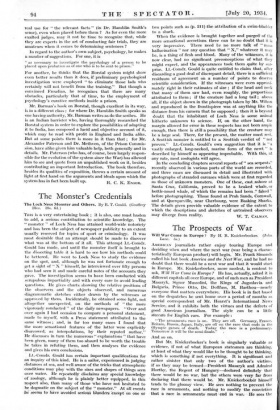The Prospects of War
AMERICAN journalists rather enjoy touring Europe and deciding- when and where the next war (war being a charac- teristically European product) will begin. Mr. Frank Simonds called his last book America and the Next War, and he had no doubt that there would be a next war and that it would start in Europe. Mr. Knickerbocker, more modest, is content to ask, Will War Come in Europe ? He has, actually, asked it in different capitals all over Europe, and of such men as President Masaryk, Signor Mussolini, the Kings of Jugoslavia and Bulgaria, Prince Otto, Dr. Dollfuss, M. Barthou—nearly everyone that matters everywhere: His book is in fact based on the despatches he sent home over a period of months as special correspondent of Mr. Hearst's International News Service, and it exhibits both the virtues and the defects of good American journalism. The style can be a little staccato for English ears. For example :
"The armaments race is on. They are off. Germany, France, Britain, Russia, Japan, Italy, are off on the race that ends in the Olympic games of death. Today the race is a preliminary. Tomorrow it will be the semi-finals." .
And so on.
But Mr. Knickerbocker's book is singularly valuable as evidence, if not of what European statesmen are thinking, at least of what they would like to be thought to be thinking, which is something- if not everything. It is significant and rather sinister that only two of the author's victims, if so they may be termed—President Masaryk and Admiral Horthy, the Regent of Hungary—declared definitely that there would be no war, but the others were very far from . declaring that there would be. Mr. Knickerbocker himself tends to the gloomy view. He sees nothing to prevent the race in armaments, and nothing to modify the conviction - that -a •race in -armaments- must • end in war.- He sees the
danger from Germany in the form not of a deliberately pro- voked attack, -which he is satisfiedHerr Hitler does not want, and for which Germany would not be ready for years to come (provided the French bloc in Europe holds together), but in the psychological effect of Germany's growing armaments.
Though he did not interview Herr Hitler, Mr. Knickerbocker found that everywhere the German Chancellor was regarded as the pivotal figure. He gives him full credit for his settle- ment, or shelving, of the Polish Corridor and Danzig questions, but he points to the possibility that the Saar may " move up to place number one in the list of possible causes of war on this Continent." It may ; but since Mr. Knickerbocker's chapter was written a settlement regarding the Saar plebiscite has been reached little less satisfactory than the settlement be- tween Germany and Poland. Mr. Knickerbocker, with justice, regards Herr Hitler's intentions respecting Austria as one of the factors most decisively critical for European peace. How far those intentions have been modified as result of the Hitler-Mussolini conversations is not yet fully revealed, but such movement as there has been is clearly in the direction of peace rather than away from it.
To that extent the sky is perhaps a shade less sombre than when Mr. Knickerbocker wrote. But his estimates and con- clusions are in no substantial degree invalidated. His book is a valuable survey—lucid, accurate and eminently readable—of the confused European scene. If he does not attempt to delve deep beneath the surface he is always conscious of the unseen forces at work there, and his con- clusions take full account of them. H. W. H.















































 Previous page
Previous page